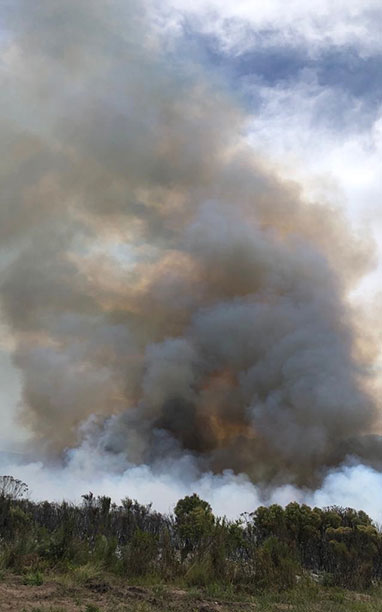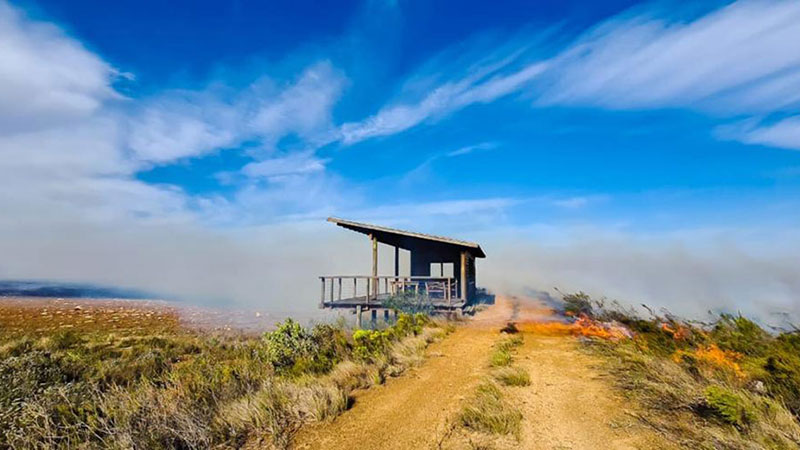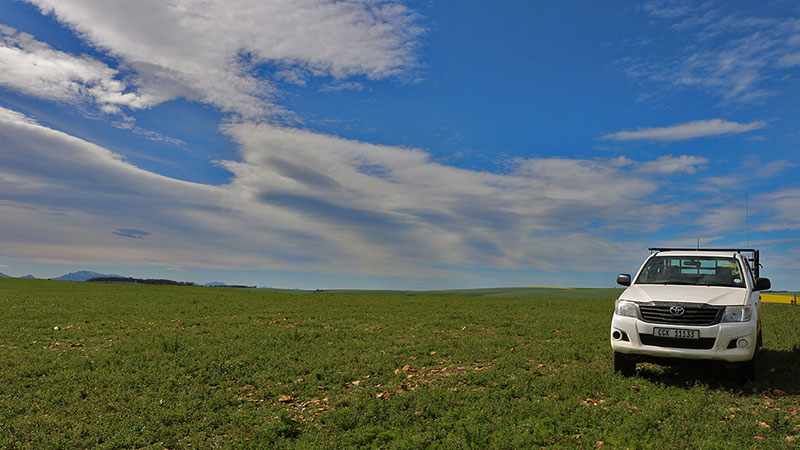
Fire season is upon us in the Western Cape, including the Overberg District.
But it’s not too late to still use this time to prepare your farm as well as you can against the threats of wildfires.
Wildfires can start at any place and at any time. The research has shown that the majority of wildfire ignitions are human related which can be accidental, negligence or malicious.

Although our Fire Services are of the highest standard, many residents and landowners bargain on the Fire Services to “save them”, which can give a false sense of hope if no prevention activities have been undertaken.

According to Louise Wessels, Manager of the Greater Overberg Fire Protection Association (goFPA), farmers in winter-rainfall areas should already be preparing during winter and spring. “But even though summer is upon us, let’s use this time to ensure our firebreaks are in place and finalise our controlled burns with the necessary permits. This is your final opportunity to get these in place.”
In the 2018/19 fire season, the Overberg experienced one of the most difficult and costly fire seasons in the history of the district.
This included the dreadful Betty’s Bay fire, which burnt 12,800 hectares, destroyed 31 properties, and cost two lives. During the much quieter 2019/20 fire season, the Overberg District Municipality still recorded 675 fires.
In providing some tips to homeowners living in or close to wildlands (in other words, close to fynbos/alien vegetation and/or mountainous areas) Wessels says, “In order to make your home and barns as safe as possible against a wildfire, make sure you have created a defendable space around the buildings. Clear fuels around your home, keep grass trimmed, remove dead leaves, keep your gutters clear, seal gaps in your air vents, and store flammable material safely. Also check regularly that your sprinklers and water pipes are working.”
Image: Enviro Wildfire Services

Preparing for summer
Wessels says, “Everything we do as an FPA feeds into being better prepared for summer – to help us prevent and control wildfires during fire season. It’s essential to be prepared.”
Overberg District Municipality Fire Chief, Reinard Geldenhuys, says fires don’t burn like they used to. “I have spent decades fighting wildfire and overseeing fire-fighting efforts. As a result of a changing climate, fires are burning faster, more frequently, and with intense heat. In some instances, it’s very difficult to bring these fires under control.”
(Note: The Overstrand Municipality’s fire season officially started on 1 November. They are still allowing controlled burns to take place, with their permission.)


Fire season
During fire season, landowners have a number of responsibilities.
Landowners should carefully monitor the Fire Danger Index throughout fire season. The most FPAs, including goFPA provides a daily update, and advises landowners and workers to take extra precautions on orange and red days.
She says, “A red day is hot, with low humidity, and very strong winds. It’s the perfect combination for an out-of-control wildfire. On these days, woodcutting and alien clearing should be suspended, and any tourist activity like hiking should be undertaken with care. Someone must monitor your farm during a red day, and must be able to communicate quickly if they see a fire.”
Pre-fire season planning
Shortly before fire season officially starts, landowners are advised to implement technical preparations. These include checking that fire units (“bakkie-sakkies”) and other fire equipment are working. If not, these must be serviced and repaired. Also look at your farm roads, entrances and escape routes. Wessels says, “Plan exit routes from your home and barns, in case you need to evacuate. When a wildfire threatens your home and livelihood, it’s difficult to think clearly. So do your thinking before the fire season starts.”
Wessels has the following additional advice:
- Mark water points with signage, so that the Fire Department can easily see them.
- Draw a rough map of your farm – including your buildings, water points and escape roads. Keep this map in your bakkie to share it with the Incident Commander if a fire threatens your farm.
- Ensure your entrance gates are big enough for fire engines and trucks. If not, plan alternative routes, and communicate these to fire-fighting teams.
- Also prepare your communications with the Fire Department before fire season. Post the Fire Department’s phone number next to your landline, or save it in your cellphone under a name you’ll find easily. Write down clear directions to your farm, and keep these at hand, so that you can communicate this during a stressful time. This will help the fire-fighting teams find your farm without delays.

Winter and Spring
“During winter and early spring, farmers are encouraged to complete their fire management plan. It’s an annual fire hazard assessment on your own property, to identify the risks, and put steps in place to reduce these threats,” says Wessels.
FPAs encourage farmers to complete fire breaks and undertake controlled burns during the cooler months. Controlled burns could focus on areas that are densely infested with invasive alien trees (and therefore a higher risk), as well as natural veld that hasn’t burnt for 15 to 20 years (and it is ecologically advisable to burn).
She says the quieter months are also an opportunity to ensure the administrative requirements associated with wildfire are in place. “This is the time to speak to your insurance broker, to find out what you are covered for should a fire start, or come onto your farm. Loss of infrastructure like fencing can be extremely costly.”
The goFPA covers nearly 700,000 hectares in the Overberg. Working at scale, we can develop integrated fire management strategies beyond farm boundaries. It also allows for collaboration and cooperation, and resource sharing between members, and with fire-fighting teams. Please check our Facebook Page (@overbergfpa) for Fire Season dates and critical arrangements.
COVID-19 and fighting wildfires
Working together with the Western Cape Fire Brigade services, and learning from international counterparts, local and district Fire Services and FPA’s have developed operation procedures to ensure safety at wildfires. Key practices include working in COVID-safe groups and maintaining a hygiene regime, while also separating groups of fighters. It is not always feasible to fight a fire with a mask, therefore a safety officer is appointed and regular screening take place.
